
• For finding a bakery, see p. 10.
• Here are key words to look for.

• Nearly all supermarkets sell bread.
• Opening times vary slightly from shop to shop but are generally 9 A.M.–1 P.M. AND 3:30 P.M.–7:30 P.M. Most bakers open earlier than other shops and are closed one day a week; the day varies from town to town.
• Although large and small loaves of bread are available, rolls are very popular. It is important to note that bread is usually bought by weight, not size.
• Bakeries often stock other groceries, particularly milk. There is no milk delivery service in Italy, and the dairy (latteria) is fast disappearing.
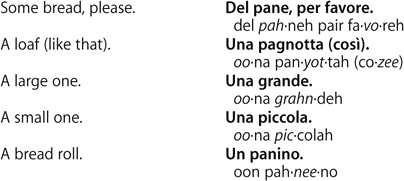
For other essential expressions, see “Shop Talk,” p. 43.
• Here are key words to look for.

• For finding a pastry shop, see p. 11.
• A bar-pasticceria is a place to buy cakes and have a drink.
• Since Italians eat very little for breakfast, they often go to a bar for a mid-morning snack.
• Most bars have only a few tables and charge more for waiter service. See “Ordering a Drink,” p. 66.
• Types of cakes vary from region to region, but there is typically a variety of cookies and small cream-filled pastries called paste fresche. These are bought by weight, and it is best to point to the selection you prefer.
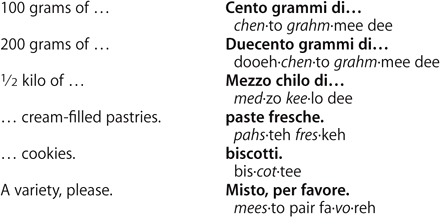
Larger pastries and cakes may be bought individually.

For other essential expressions, see “Shop Talk,” p. 43.
• Here are key words to look for.

• The sign Gelati-produzione propria means that the ice cream is made daily on the premises and is particularly good.
• The best-known ice-cream brands are the following.

• Every gelateria and cremeria has its own specialties, which are either described on menus or displayed on posters.
• Specialties vary from region to region.
• Pre-packaged sweets are also available in supermarkets, bars, and bakeries.
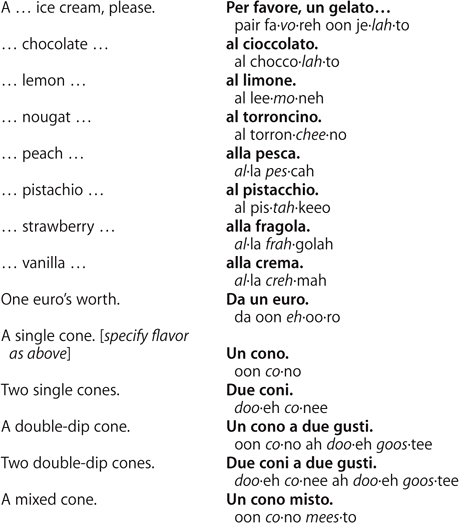
For other essential expressions, see “Shop Talk,” p. 43.
• Here are key words to look for.

• Here are the supermarket chains found in most parts of Italy.

• Here are common signs at supermarkets.

• Supermarket hours vary but are generally 9 A.M.–12:30 P.M. and 3:30 P.M.–7:30 P.M.
• For nonfood items, see “Replacing Equipment,” p. 41.
• It is usually not necessary to say anything in a supermarket, but you should ask if you don’t see what you want.
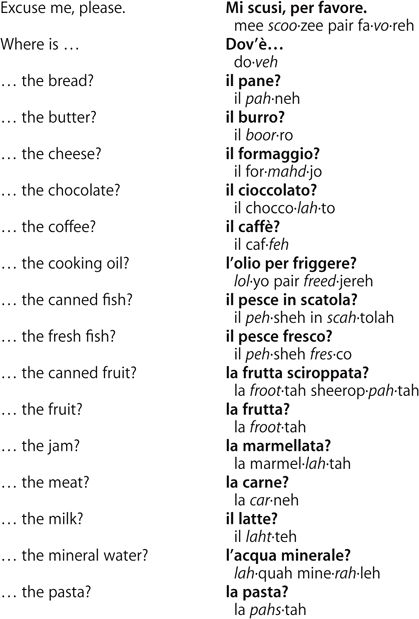
For other essential expressions, see “Shop Talk,” p. 43.
• Here are key words to look for.

• In these shops, you can buy a wide variety of food, such as ham, salami, cheese, olives, appetizers, sausages, and freshly made carry-out dishes. Specialties vary from region to region.
• Here’s a guide to the amount of prepared salad to buy.
2–3 ounces/70 grams per person, if eaten as an appetizer to a substantial meal
3–4 ounces/100 grams per person, if eaten as the main course of a picnic-style meal
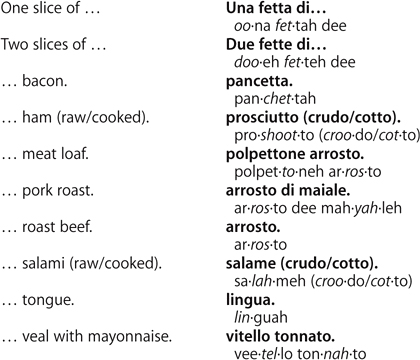
You might also like to try some of the following foods.
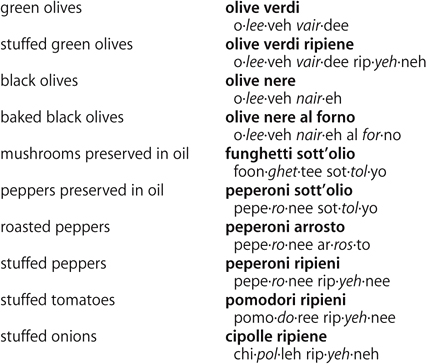
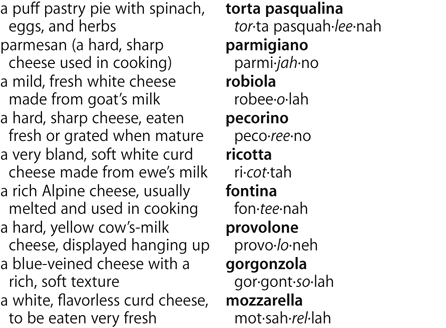
For other essential expressions, see “Shop Talk,” p. 43.
• Here are key words to look for.

• If possible, buy fruit and vegetables at a market, where they are cheaper and fresher than in stores and shops. Open-air markets are held once or twice a week in most areas (sometimes daily in large towns), usually in the mornings.
• It is customary for you to choose your own fruit and vegetables at the market (and in some shops) and for the attendant to weigh and price them. You must take your own shopping bag; paper and plastic bags are not typically provided.
• Weight guide: One kilo of potatoes serves six people.
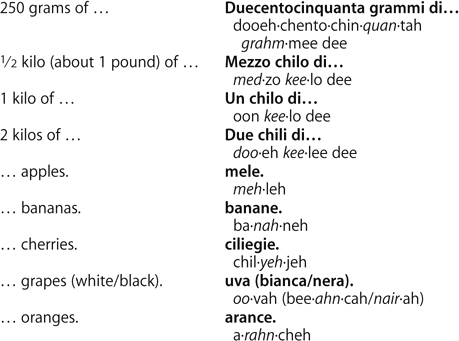
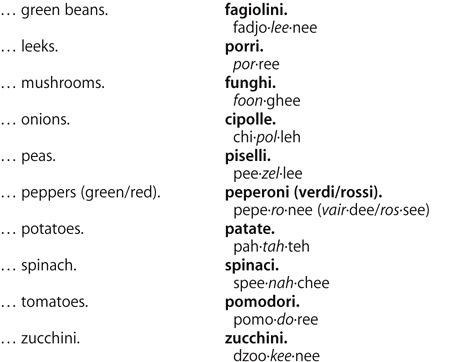
The following fruits and vegetables may not be familiar to you.
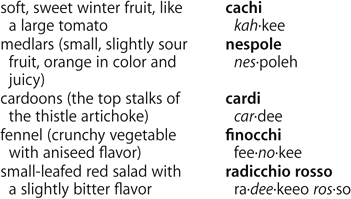
For other essential expressions, see “Shop Talk,” p. 43.
• Here are key words to look for.

• Butchers, especially in small towns and villages, often display a white sheet outside their shops for identification.
• Weight guide: 4–6 ounces/110–170 grams of meat serves one person.
• The accompanying figures can help you make sense of labels on counters and supermarket displays. Translations are often unhelpful, and you won’t need to say the Italian word.
• Mutton and lamb are sold and eaten only around Easter.
To buy a roast, first indicate the type of meat, then say how many people it is for.
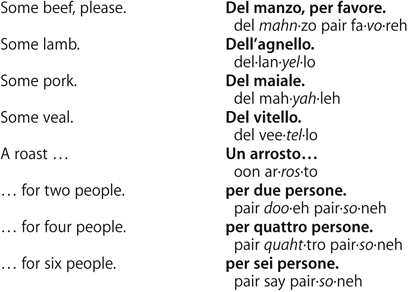
For steak, liver, and heart, the same method of ordering applies.

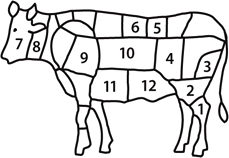
1 Stinco
2 Muscolo
3 Girello
4 Coscia, noce, rosa
5 Lombo, filetto
6 Costata
7 Guancia, testa
8 Collo
9 Polpa di spalla
10 Costata
11 Punta di petto
12 Pancia
Veal Vitello
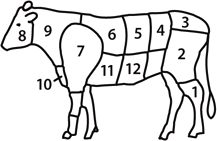
1 Ossobuco
2 Cosciotto, magatello, noce
3 Codino
4 Lombata, nodini, costolette scamone
5 Filetto
6 Copertina di spalla
7 Spalla, capello del prete, fusello
8 Testina
9 Collo
10 Fiocco di petto
11 Punta di petto
12 Pancetta
Pork Maiale
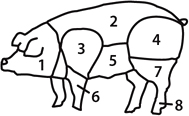
1 Testina
2 Coste, lombata, lonza, filetto
3 Spalla, prosciutto di spalla
4 Coscia, prosciutto di mezzo
5 Petto, pancetta
6 Cosciotto
7 Coscia, zampone
8 Piedino
Lamb, kid Agnello, capretto
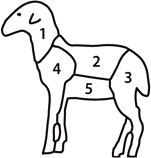
1 Testina, collo
2 Sella, costolette
3 Cosciotto
4 Spalla
5 Petto
For chops, order in the following way.

You may also want the following.

For other essential expressions, see “Shop Talk,” p. 43.
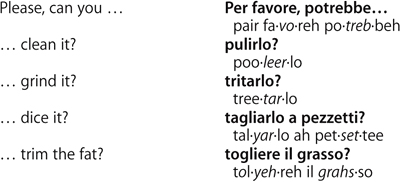
• Look for the following signs.

• Another sign to look for is Frutti di mare (shellfish).
• Large supermarkets usually have a fresh fish department.
• Weight guide: A minimum of 9 ounces/250 grams of fish on the bone serves one person. Use the following table as a guide.

Purchase large fish and small shellfish by weight.
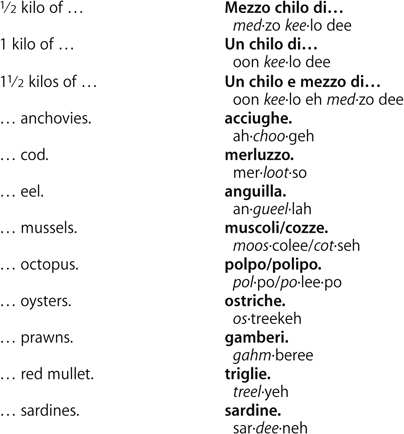
Some large fish can be purchased by the slice.
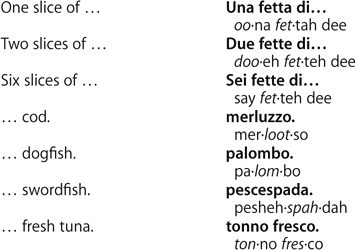
For some shellfish and “frying pan” fish, specify the number you want.
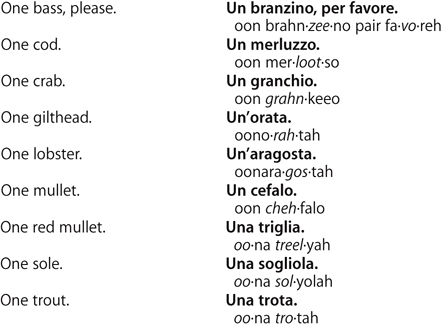
For other essential expressions, see “Shop Talk,” p. 43.
